Dermatology at Christchurch Hospital

Service Overview
The Dermatology Resource Unit (DRU) is based on the Christchurch site. The service delivers a full range of medical and surgical treatments using four fully equipped minor operation theatres, three clinical treatment rooms and a phototherapy suite.
Patients are seen primarily in Christchurch Hospital Outpatients Department, for their initial consultation. They may then be referred for investigations/treatment. The full nursing complement undertakes a range of day treatments, the running of the methotrexate and biologic medicine clinics, leg ulcer clinic, and phototherapy, patch testing, iontophoresis, and dermatology paediatric services.
The dermatology team also manage inpatients on the Bournemouth site.
Contact us
Our Address:
Dermatology Resource Unit
Christchurch Hospital
Fairmile Road
Christchurch
BH23 2JX
Map of Christchurch Hospital – Dermatology Department highlighted in purple
Rearranging or cancelling an outpatient appointment
Rearranging or cancelling a new patient appointment
- Please call the following number: 0300 019 4738 (choose option 2)
Rearranging or cancelling a follow up appointment
- Please call the following number: Follow up patients: 0300 019 4738 (choose option 3)
Rearranging or cancelling an appointment for surgery
We strongly recommend you communicate any dates you cannot make to us at the earliest opportunity and aim to keep your original date for surgery where possible.
Rearranging or cancelling a surgical appointment
- Please call the following numbers to speak to our surgical admissions team:
0300 019 5253 [please note: this phone line is manned between 08:30-16:30]
0300 019 5486 [please note: this phone line is manned between 08:30-16:30]
Secure image transfer service
Patients
Address
Christchurch Hospital
Fairmile Road
Christchurch
BH23 2JX
Tel. 01202 486361
Where we hold our outpatient appointments
Please read your appointment letter carefully as we see patients in two locations for dermatology outpatient appointments.
If your letter says:

The Outpatient Department looks like:
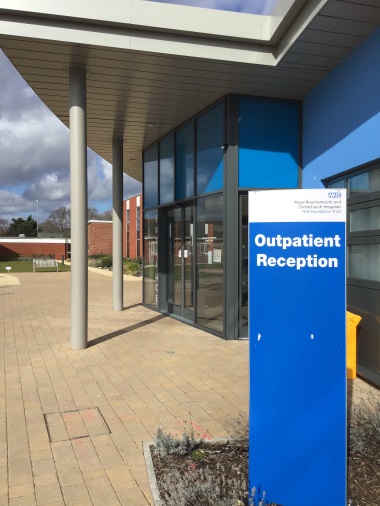


The closest car park to the Outpatients Department is Car Park A.
If your letter says:

The Dermatology Resource Unit looks like:
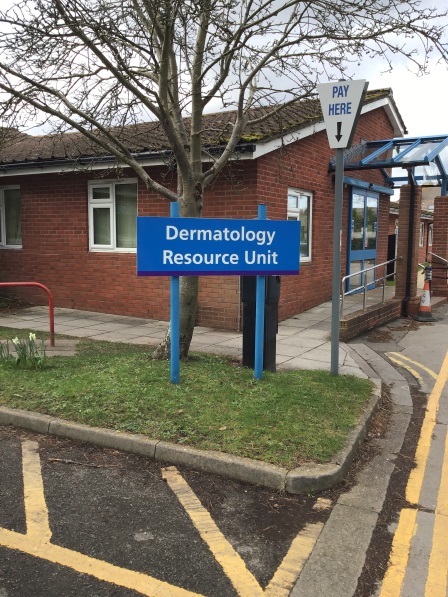
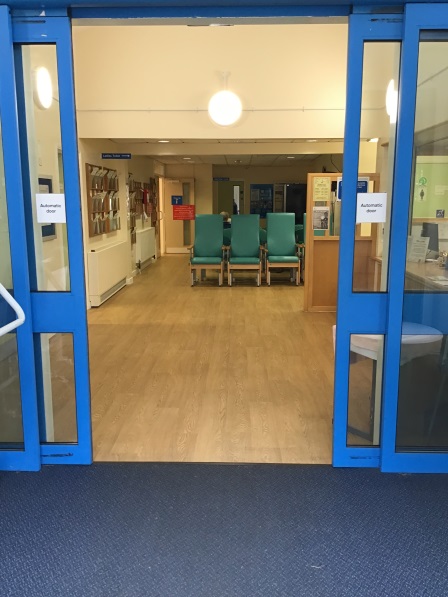
The closest car park to the Dermatology Resource Unit (DRU) is Car Park E which is directly opposite the entrance to DRU

Before your appointment
Please bring with you details of all medications you are taking or have taken in the recent past, either for your skin or for any other condition you may have. This should include prescriptions from your doctor or other specialist, any alternative or herbal remedies and anything you have bought over the counter.
At your appointment
Your first appointment may take up to an hour. We make every effort to see you on time, but delays may occur so please allow plenty of time.
The clinician will take a full history and conduct an examination. In order to properly assess your skin problem, you may be asked to undress so that all your skin, not necessarily just the area(s) affected, can be examined. You will automatically be offered a chaperone should any intimate area of your body need examination, but in addition, please feel free to request a chaperone at any other time for any or all of the consultation.
We may request your permission to take photographs, to help form part of your clinical record or for reference in helping identify specific areas that may require treatment, such as skin surgery. These images will be stored electronically by the Hospital and shared with clinical personnel only when necessary.
It may be necessary to do additional investigations during your appointment including blood tests, skin sampling and/or skin biopsy. In these circumstances you will be provided with further detailed information.
After your appointment
If the doctor/nurse decides you need treatment, a letter will be sent to you and your GP providing a summary of your appointment outcome and explaining which medicines you may need prescribed.
Referrals
All GP referrals must be submitted using the NHS e-Referral service (formerly 'Choose and Book').
Referrals sent by post from GPs will not be processed.
Dermatology videos
Team Dermatology are currently working on some informational videos – please check back soon!
BAD Patient Information Videos
FFT scores
Dermatology at Poole Hospital
The dermatology service provides the diagnosis and management of a wide range of skin diseases for both adults and children. This includes inflammatory skin diseases, skin surgery, dermatitis patch testing, laser treatment and mole mapping. Both inpatient and outpatient facilities are available at Poole Hospital.
The services offered by dermatology include:
- Diagnosis and management of skin disease in adults and children
- Skin surgery – treatment of pre-malignant and malignant skin disease under local anaesthetic
- Skin grafts
- Laser treatment of skin lesions
- Mole mapping
- Leg ulcer clinics (nurse led)
- Patch testing service
- Cryotherapy of benign and pre-malignant lesions
- Phototherapy – PUVA (topical and oral) and narrowband UVB treatment of dermatosis
- Day treatment – topical applications for inflammatory dermatosis, including wet and dry wrapping
- Photodynamic therapy of pre-malignant lesions
Please see the below documents on how to send photos to us (for Poole Hospital dermatology patients only).
- Using the secure image transfer service
- How to take a photo
- Link to Poole secure image transfer service
About eczema - the itchy skin condition
Eczema can affect people of all ages and can be a long term problem, it has a big impact on people's lives.
Eczema causes redness, dryness and itching of the skin which can affect how you sleep, your ability to concentrate and your self-confidence, particularly if it is active and getting worse (flaring). But there is help out there, the right treatment can really help a person cope with the problem, getting into good skin care habits and following a regular treatment plan can really help
In the dermatology department at Poole Hospital, doctors and nurse specialists see patients who have been referred by their GPs with difficult to control eczema. They give information about what causes eczema and can help make sense of why treatments are important and how to use them.
Advice to help control the itchy skin condition
- Avoid products that can irritate the skin (irritants) that can cause inflammation and dryness such as soap and shower gels. If you have sensitive skin, give perfumed products a miss - look for the words 'parfum' or 'aroma' in the ingredients list as even products labelled as 'fragrance-free' can contain this
- Dry skin is prone to getting eczema - regular and generous use of the right emollients (moisturisers) formulated for eczema helps to reduce the dryness that causes eczema and is a really important part of treatment. A good time to use your emollient is after bathing or showering
- Using emollient twice a day, and more often if the eczema is severe, can help to reduce the amount of steroid cream needed to treat eczema in the long run
- When showering or bathing, use products that help increase the moisture in the skin rather than normal shower gels and soaps that remove oil from the skin and dry it out. Good products to use include bath oils (non-perfumed ones), emollient-based soap substitutes and shower emollients formulated for eczema. Your pharmacist can advise about this.
- Don't use aqueous cream as a moisturiser for eczema because it contains a detergent called SLS which can irritate the skin and make eczema worse.
- Scratching and rubbing the skin when the eczema is bad can actually make the problem even worse – this is known as the 'itch-scratch cycle'.
- Don't stop using your moisturiser when the eczema settles - keeping your skin healthy on a regular basis helps to prevent future flare-ups.
Seek advice if your eczema doesn't get better. Steroid creams prescribed by your doctor can be a very important part of the treatment if the eczema is inflamed and if used in sufficient quantities can make a big difference to how the eczema is controlled.
Some treatments available for severe cases of eczema, if all other treatments have failed, include phototherapy (artificial sunlight) and tablets that help the immune system (immunosuppressants). These are given under the supervision of a dermatologist (a doctor who specialises in seeing people with skin disease and is an expert in treating skin problems).
Some common types of eczema
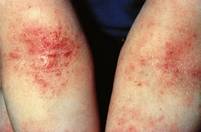
Infected eczema, bacterial and viral infections can cause eczema to become suddenly worse (or flare) and flares can need treatment with antibiotics as well as steroid creams and emollients.
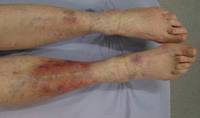
Venous/varicose eczema - varicose (or venous) eczema can occur on the lower legs in people with varicose veins and causes an itching, redness and dryness of the skin which can sometimes be mistaken for cellulitis (infection). Like other forms of eczema, it responds to treatment with emollients (moisturiser) and steroid creams.
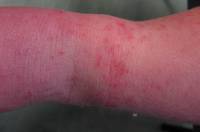
Lichenification is caused by scratching or rubbing the patches of eczema because it is a really itchy - this can cause thickening and creases in the skin - commonly seen behind knees and elbows.
Dermatology
The dermatology service provides the diagnosis and management of a wide range of skin diseases for both adults and children.
Please see the links below for more information:









